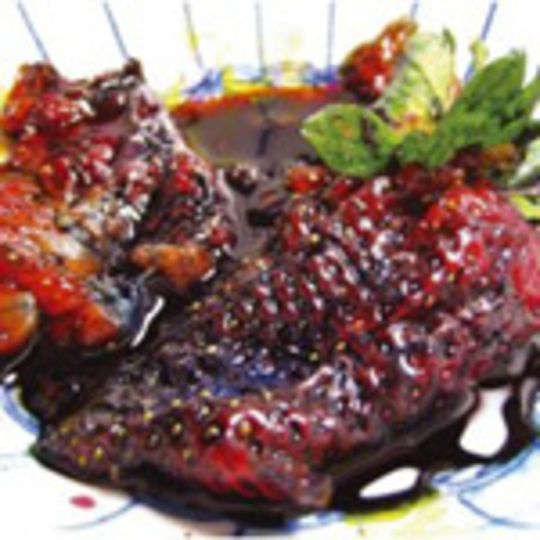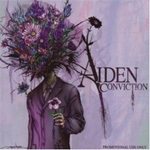It’s been two years since Animal Collective’s last full-length release proper. Feels’was stunning, the kind of album that possessed the ability to seduce anyone willing to surrender just a little time to it. From ‘Did You See The Words’ right through to ‘Turn Into Something’; the chemistry between those reverb-washed guitars and contagious, asymmetric melodies ensured each of the nine cuts hit on a strange, sweet angle. In a list of all-time favourite love records, Feels, in its skewed, intimate glory, sits pretty high up there. Any qualms, just ask one simple question: did Marvin ever pen a line as damn honest as ‘The Purple Bottle’’s “Sometimes I’m naked and thank god sometimes your naked”? No. He did not.
Back in October 2005, Feels could have easily gone down as the seminal work from the Baltimore four-piece’s consistently remarkable output. However, with the release of Strawberry Jam, this debate is once more thrown to the wind. Beside its predecessor, …Jam possesses little desire to sit comfortably with its listener, instead stretching out, sprawling and cavernous. Whilst the visceral joy of Feels remains in part, it is joined in equal measure by a sense of violence and anxiety. In mining much darker emotional territory, Animal Collective have produced the record of their career; …Jam is a masterpiece of mood, composition and delivery. Even in an age of tiring critical hyperbole, it is difficult to deny that this album is the most profound (re)imagining of the pop music aesthetic of recent times.
From the very outset, a transformation has clearly occurred. Whilst structurally …Jam largely adheres to pop conventions - most tracks being based around a simple verse/chorus progression - an immediate discord is struck by the treatment of the vocals. As Avey Tare’s voice permeates the gurgling introduction to ‘Peacebone’, it enters unprocessed, unflanked by harmony and dominant in the mix. Utilised throughout …Jam, this new aesthetic enables the listener to inhabit the album’s lyrical landscapes in all of their glittering light and ominous shadow. With this fresh perspective, the popular misconception of Avey’s lyrics solely promoting the surreal becomes futile. At the heart of ‘Peacebone’’s dreamscape of dinosaur wings and cloud-carved mountains, a lament on the pitfalls of nostalgia clearly resides. Between the frightened babies and coloured water of ‘Fireworks’, an explicit awareness of eternal transience lingers.
The power of the bare voice reaches its apex in the epic ‘For Reverend Green’. Over six and a half grinding minutes, Avey line-by-line constructs a Brueghelian tableaux of American moral anxiety inhabited by burnt children, scores of wasted Brooklyners and a bulimic weight contest queen. Delivery is the key factor here. It’s the juxtaposition between Deakin’s cold, delay-heavy guitars, Panda’s increased-heartbeat floor toms and that voice or more specifically that scream which secures a devastating emotional impact. A howl in the dark against the neglect of insight, the dominance of the material over the spiritual, ‘Reverend’ is both …Jam’s most overtly political moment and its crowning glory.
The slow-burning ‘#1’ provides a welcome contrast to a largely rhythm-driven set. The only track to utilise overt vocal modulation, its ethereal narration serves a very distinct purpose in embodying a departed father figure. Almost mantra-like in mood, ‘#1’’s impressionistic depiction of a fractured family unit reaches no resolve, its tumbling arpeggio simply trailing off into eventual silence. A departure for the band, it feels like an almost mistaken, but very much welcome, step into the unknown.
‘Cuckoo Cuckoo’ is another moment in which Animal Collective reach a new level of compositional mastery and broaden their territory. Based around a simple piano motif, the song’s incessant peaks and troughs evoke claustrophobia in an alarmingly vivid, physical sense. Once again the vocal delivery is fearless, Avey placing the surreal alongside the painfully direct to unprecedented effect.
Panda Bear, conjuror of infectious, spontaneous melody, doesn’t disappoint with album closer ‘Derek’ and the tribal chant that is ‘Chores’. Alongside ‘Peacebone’ and ‘Winter Wonder Land’, ‘Chores’ is perhaps the finest example of the lean physicality which makes …Jam such a joy to experience. Noah’s unique ability as a composer is in channelling the day-to-day through melody to reach the sublime, and ‘Derek’ achieves this effortlessly. In just three minutes, with little more than percussion, guitar and voice, Noah transports the narrative of a childhood pet dog to another place altogether. It is the perfectly displaced closing gesture, strangely tying up all that has come before and all that is to follow.
In its very placement, ‘Derek’ confirms that, with or without major record deal, Animal Collective have no time for self-serving grand gestures, but only the pursuit of divine pop music by strictly earthly means.
-
10Nicholas Garcia's Score






















